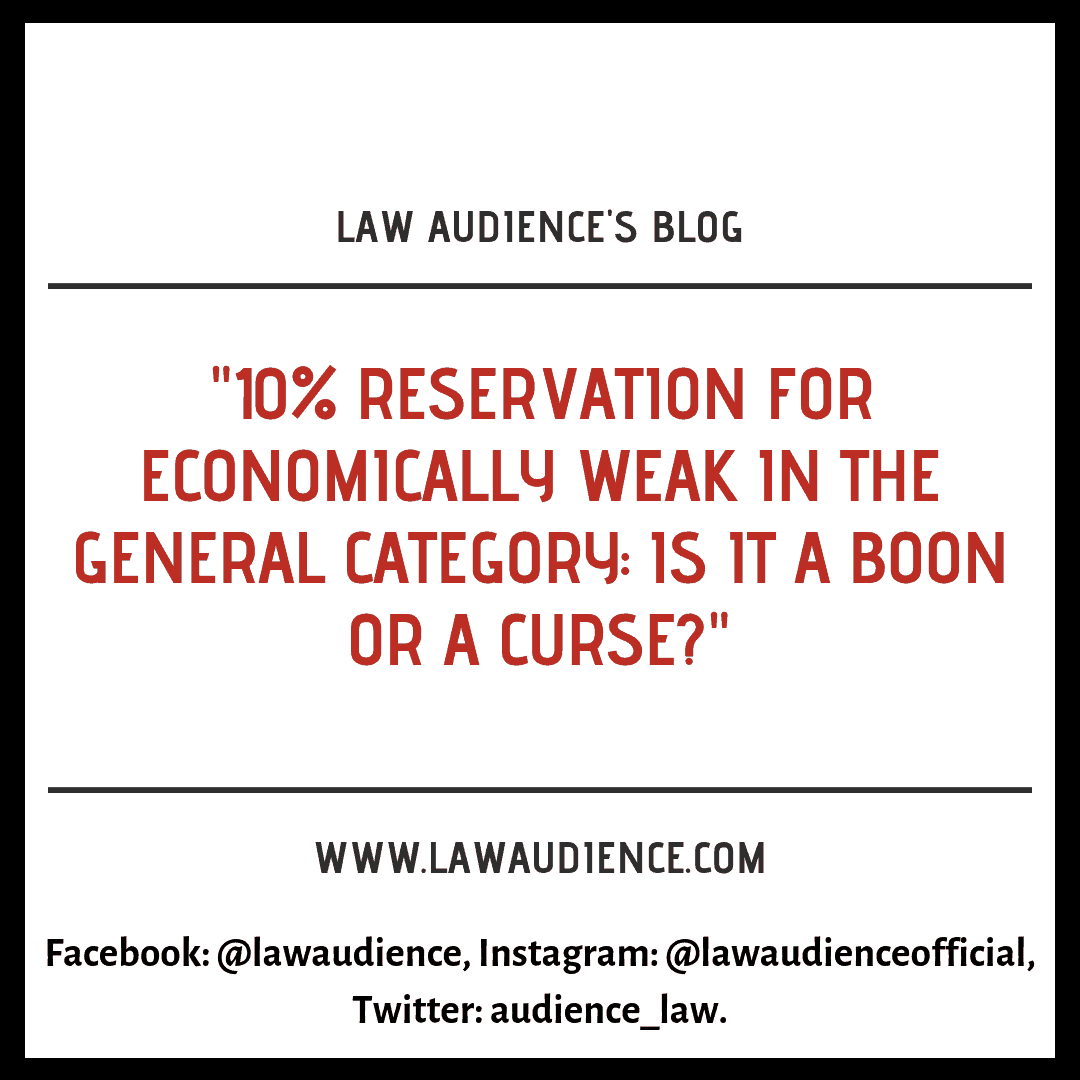AUTHORED BY: MS. NISHITA KAPOOR, B.COM.LL.B, STUDENT AT UNIVERSITY INSTITUTE OF LEGAL STUDIES, PANJAB UNIVERSITY & RESEARCH WRITER AT LAW AUDIENCE.
I. INTRODUCTION:
Till date, it has been the most controversial issue that whether there should be reservation or not and if it should be there than on what basis. Reservation is a tool to fight against social oppression and helps the state to uplift the status of the various classes of its citizens. The origin of reservation dates back to the time soon after the independence. It was in the year 1951 that Article 15(4) was added in effect to the Supreme Court’s decision disallowing government’s decision of reservation of seats in state colleges for different communities.[1]
Initially, the reservation was meant for SC/ST communities for a period of 10 years only but gradually the time period got extended and even the Other Backward Classes were included within its scope. By the judgment of the Supreme Court in the case of National Legal Service Authority v. Union of India[2], the transgender people have also been held to be entitled to the benefit of reservation as the socially and educationally backward classes.
II. OBJECT OF RESERVATION:
The objective behind introducing the reservation system was that there were certain categories of people who were financially weak and were socially oppressed for belonging to so and so category. It was to bridge the gap creeping into the people belonging to different communities, that seats were reserved for certain communities. But the government failed to consider that there was a big group of people other than the socially suppressed classes, who on account of their financial incapability are not able to develop and progress in life.
III. 10% RESERVATION FOR ECONOMICALLY WEAK IN THE GENERAL CATEGORY:
However, recently the Central government has passed the Constitutional 103rd Amendment Act, 2019, which has amended the Articles 15[3] and 16[4] to provide 10% reservation in government jobs and education to the economically backward section in the general category. This reservation would be in addition to the existing reservations and will be subject to a maximum of 10% of the total seats in each category.
IV. IS IT A BOON OR CURSE?:
The move of the Parliament to provide reservation to the upper class has brought a revolutionary change in the system of reservation. It has introduced an additional reservation in the system without disturbing the existing one. People belonging to the upper caste and falling in the lower income group suffer a lot, so this is truly a Big Boon for them. The system of reservation has been very unfair for them in the past. They were lagging behind on two fronts, they neither had reservation nor money and it is noteworthy that fraction of such population even suffers for the basic amenities or have very minimal resources. In such circumstances, reserving a seat for them in the educational institutions and for public employment can do wonders in their life and would really be helpful in improving their economic condition.
These, Except the BPL provisions, they had no other special provision for their benefit but now their position is expected to change for good. It will help to establish equity and provide equal opportunities, thereby improving the position of the underprivileged in majority communities. It will bring them from the sideline into the mainstream and improve their economic and social status as well. They would be able to compete with the ones who already have plenty of facilities and eventually this step would ensure equal distribution of the wealth. The doors of the world full of vast opportunities will be open for them, and at least they will have a chance to explore it.
The most important feature of this amendment is that it would not remain static as against the reservation for certain caste. It is not that once a person belonging to the upper class has availed the benefit of reservation on the basis of the economic criterion that he will continue to hold it forever and pass it on in his legacy. Once, the family of such person crosses the limit of income set by the government, he will not be entitled to avail this benefit whereas if compared with the caste based reservation, the benefit is passed on from one generation to the other generation, making the system of reservation static.
V. CONCLUSION:
It is a totally fallacious assumption that only certain castes are backward and hence solely on this account they be awarded reservation. In actual, the weaker and underprivileged people do not necessarily belong to a certain caste. Hence, this move of the government of introducing reservation for the general category by fixing an income cap is totally a positive step which will benefit the needy in the real sense.
It is noteworthy that in the landmark case of Indra Sawhney v. Union of India[5], also called the Mandal Commission Case, Supreme Court held that economic criterion cannot on itself be a ground to be identified as a class unless it is on account of social backwardness. It held that no reservations could be based exclusively on the economic criterion. Not only this, but it had also set a ceiling of 50% in reservations. Now the present decision of the Central Government clearly is against the stance of the Supreme Court in that case.
Also recently, YOUTH FOR EQUALITY, an NGO has filed a Public Interest Litigation challenging the amendment on the ground that economic criterion cannot be the sole basis for reservation and contended that it violated the basic structure of the Constitution.[6] Supreme Court has refused to stay the operation of the Amendment but however has agreed to examine its constitutional validity. Now, it will be a matter of great concern that whether the economically weaker class would be able to avail this benefit or it would be scrapped by the Supreme Court for negating its previous judgment.[7]
According to the writer, the next move of the Government should be that the entire reservation system should undergo a change and only the “Economic Criterion” should be made the basis of determining the reservation.
[1] State of Madras v. Champakam Dorairajan, A.I.R. 1951 S.C. 226 (India).
[2] A.I.R. 2014 S.C. 1863 (India).
[3] ARTICLE 15 OF INDIAN CONSTITUTION AS AMENDED BY THE CONSTITUTION (ONE HUNDRED AND THIRD AMENDMENT) ACT, 2019:
In article 15 of the Constitution, after clause (5), the following clause shall be
inserted, namely:
‘(6) Nothing in this article or sub-clause (g) of clause (1) of article 19 or clause (2)
of article 29 shall prevent the State from making,—
(a) any special provision for the advancement of any economically weaker
sections of citizens other than the classes mentioned in clauses (4) and (5); and
(b) any special provision for the advancement of any economically weaker
sections of citizens other than the classes mentioned in clauses (4) and (5) in so far as such special provisions relate to their admission to educational institutions including private educational institutions, whether aided or unaided by the State, other than the minority educational institutions referred to in clause (1) of article 30, which in the case of reservation would be in addition to the existing reservations and subject to a maximum of ten per cent. of the total seats in each category.
Explanation: For the purposes of this article and article 16, “economically weaker sections” shall be such as may be notified by the State from time to time on the basis of family income and other indicators of economic disadvantage.’
[4] ARTICLE 16 OF INDIAN CONSTITUTION AS AMENDED BY THE CONSTITUTION (ONE HUNDRED AND THIRD AMENDMENT) ACT, 2019:
In article 16 of the Constitution, after clause (5), the following clause shall be inserted, namely:
“(6) Nothing in this article shall prevent the State from making any provision for the reservation of appointments or posts in favour of any economically weaker sections of citizens other than the classes mentioned in clause (4), in addition to the existing reservation and subject to a maximum of ten per cent of the posts in each category.”
[5] A.I.R. 1993 S.C. 477 (India).
[6] Priyanka Mittal, Quota Bill Challenged in Supreme Court day after its passage, LIVE MINT (Jan. 25, 2019, 9:07 PM), https://www.livemint.com/Politics/7E4i02tAzs9FYMFCN5FHgN/Quota-bill-granting-10-reservation-to-economically-weaker-s.html.
[7] HT Correspondent, SC seeks Centre’s response on 10% quota, refuses to stay amendment, HINDUSTAN TIMES (Jan. 25, 2019, 9:30 PM), https://www.hindustantimes.com/india-news/sc-seeks-centre-s-response-on-10-quota-refuses-to-stay-amendment/story-sGNmKbVCxHwdpO2Bm7imZP.html.



